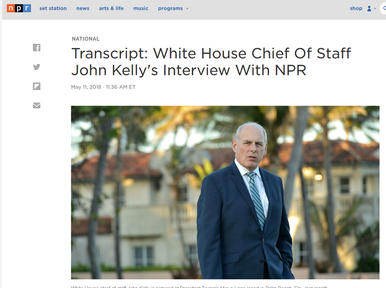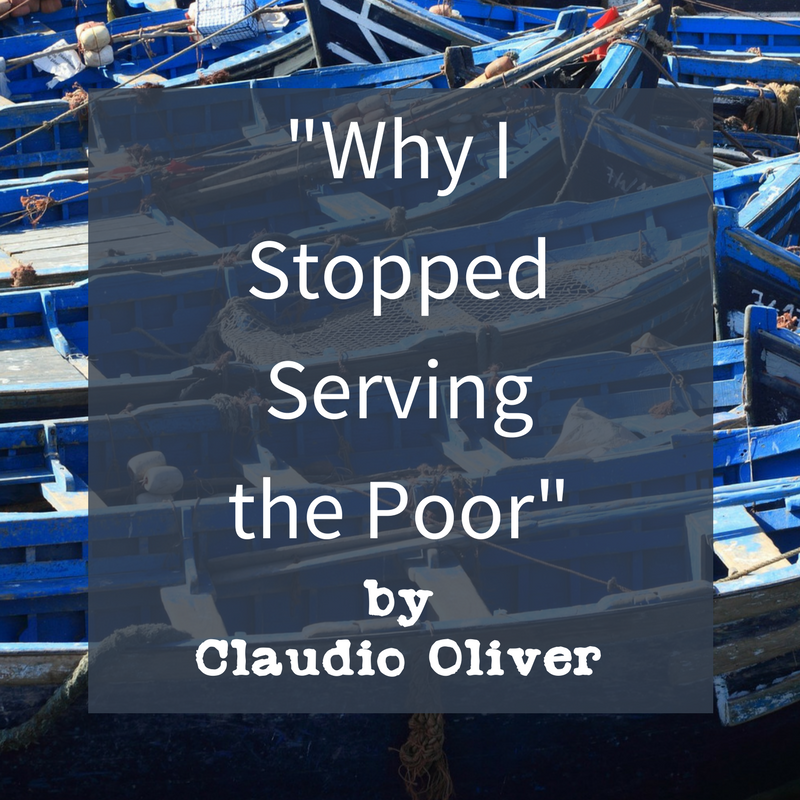 This is an article I tried to get published in May of 2018, right after Gen. Kelly was interviewed by NPR where he said that the children separated from their parents at the border would go into "foster care or whatever." Recently the President of the United States called some illegal immigrants “animals”. The dehumanization of this administration is rampant, and as the Church body, we must be pro-life, including being pro-immigrant life. In a recent interview with NPR, General John Kelly admitted that family separation could be a tough deterrent for illegal immigration. The interviewer asked, “Even though people say that's cruel and heartless to take a mother away from her children?” Mr. Kelly responded, “I wouldn't put it quite that way. The children will be taken care of — put into foster care or whatever. But the big point is they elected to come illegally into the United States and this is a technique that no one hopes will be used extensively or for very long.” Again, as the Church body, we take issue with this type of talk. As a current foster mom of an immigrant child, I find Mr. Kelly’s statement devoid of humanity and perpendicular to the purpose of foster care. In light of this month being national foster care awareness month, I think it is important to understand first and foremost the purpose of foster care. According to the U.S. Department of Health & Human Services’ Children’s Bureau, the foster care “program’s focus is children who are eligible under the former Aid to Families with Dependent Children program and who were removed from their homes as the result of maltreatment, lack of care, or lack of supervision.” Foster care is meant to serve children whose parents have been charged with dependency, abuse or neglect. Those families then get about 12 months (depending on the state and the courts) to rehabilitate by taking parenting and anger management classes, finding safe and appropriate housing, and proving they are clean from drugs. The Department’s intent is always to reunite the children with their family as long as it is in the best interest of the child. Social workers and foster families see the lasting effects of biological families being torn apart. It is hard on everyone involved. It is not something anyone wants. If Mr. Kelly would sit in family court, interview a foster family, or speak to social workers, he would understand that splitting apart families is only done for the protection of the children. It is never done to punish the parents out of spite. That would be cruel. That would be heartless. While I cannot give details of my own foster child’s case, I can say that there are language and cultural barriers that must be overcome in these situations. Even though my husband and I can speak Spanish because we lived in a Spanish-speaking country for over four years, there are still major cultural differences between us and our foster child. Praise God for avocados and tortillas. Additionally, the child’s dialect of Spanish is different than ours. Speaking two languages in our home involves translating rules on the spot, making sure every child understands what to expect, and often involves us speaking the wrong language to a child because we get jumbled up in stressful moments. When one child disregards our directions, we have to think back and ask ourselves: did I give them those instructions in both languages? It has proven to be an even deeper layer of exhaustion than our previous foster care placements. In fiscal year 2016, nearly 28,000 unaccompanied minors (17 and under) crossed into the United States. If ORR’s sponsorship families that take these children in cannot care for them or worse, do not care for them by abuse or neglect, the children move to foster care. Nothing is simple about that process. Additionally, there is an increasing national demand for foster parents. A Washington Post article from July 2017 says, “State budgets are stretched, social workers are overloaded, and not enough families are willing to provide children with temporary homes. American foster care, experts say, is in crisis.” It’s an invisible crisis that literally happens behind closed doors. “There is no national foster care movement, no viral social media campaigns or crowds of protesters taking to the streets to battle for these children. No household name like Teach for America or AARP devoted to fighting for kids in foster care. Foster youths are, by definition, wards of the state, but when was the last time you heard any elected official talking about them?” said Sherry Lachman in an New York Times article. “As more Americans struggle with opioid addiction and find themselves unable to perform their duties as parents, children are pouring into state and county foster care systems. In Montana, the number of children in foster care has doubled since 2010. In Georgia, it has increased by 80 percent, and in West Virginia, by 45 percent.” Families coming to the United States seeking asylum from violence and economic oppression, especially Central American women and children seeking to escape the femicide that plagues what is called the Northern Triangle, should not be targeted as parents that have abused or neglected their children. So many are leaving their own homes and countries to flee abuse. Doctors Without Borders calls the emigration of the Northern Triangle a “neglected humanitarian crisis” and in 2016 the United Nations High Commissioner for Refugees (UNHCR) called the Central American immigration issue a protection crisis. “‘We are particularly concerned about the rising numbers of unaccompanied children and women on the run who face forced recruitment into criminal gangs, sexual- and gender-based violence and murder,’ [UNHCR spokesperson Adrian] Edwards told journalists. U.N. High Commissioner has called it a refugee crisis.” It seems Mr. Kelly’s idea is for one crisis to envelope another; and for those fleeing abuse to suddenly be guilty of abuse themselves. I am for immigration reform; specifically, I agree with what World Relief has laid out in their letter to President Trump and Congress. I am also for more Christians—like myself—getting involved in foster care and immigration reform. But as a Christian, as an American, and as a foster mom, I cannot and will not stand for politicians dehumanizing these issues and throwing around ill-thought ideas on how to support the crises at hand. These issues have faces, names, identities, and stories. If Mr. Kelly would like to come jump on the trampoline with my foster child and actually hear the story that brought the child to our home, maybe, just maybe, he would recognize that punishing parents by splitting them from their children is a horrible idea for an immigration policy from a nation that claims to be Christian.
0 Comments
Leave a Reply. |
Gena's
|

 RSS Feed
RSS Feed

